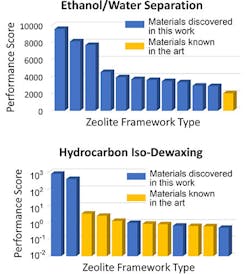Study finds optimal zeolites for biofuel, petroleum processing
Researchers from the University of Minnesota and Rice University have identified new materials that could improve biofuel and petroleum processing.
The research team used one of the largest supercomputers in the world to help find out which zeolites might improve biofuel and petrochemical processes.
Zeolites are used by refineries as molecular sieves to sort, filter and trap chemical compounds and to catalyze chemical reactions necessary to produce and upgrade fuel and chemical feedstock from petroleum-based and renewable resources.
With more than 200 known zeolites and hundreds of thousands predicted zeolite variations, the researchers turned to Mira, a supercomputer with nearly 800,000 processors, to assess which zeolites work best.
They developed a complex computational screening process that can look at thousands of zeolites in the virtual world and identify their performance for specific applications. This reduces the need for trial and error experimentation in the lab, the University of Minnesota said.
"Using a supercomputer at Argonne National Laboratory, we are able to use our computer simulations to compress decades of research in the lab into a total of about a day's worth of computing," explained lead researcher Ilja Siepmann, a University of Minnesota chemistry professor and director of the U.S. Department of Energy-funded Nanoporous Materials Genome Center based in Minnesota.
The computations identified zeolites to address two complex problems: the current multi-step ethanol purification process involved in biofuel production, and the upgrading of petroleum compounds into higher-value lubricant and diesel products.
The University of Minnesota has two patents pending on the research and said that it hopes to license these technologies.
Details of the study have been published in the research journal Nature Communications.

